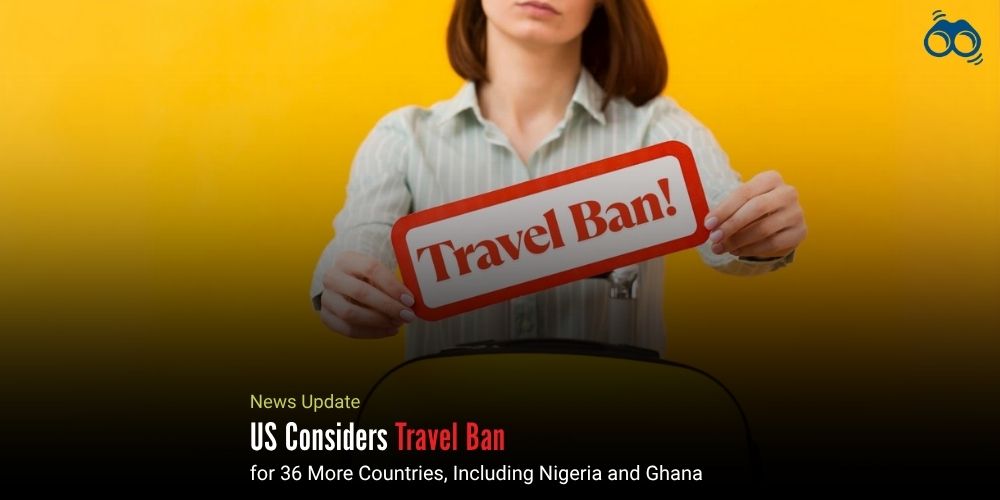Nigeria and Ghana Among Nations Facing U.S. Visa Curbs Amid Rising Student Demand
Trump Administration Targets African Nations in Sweeping Immigration Crackdown
In a development that has reignited global apprehension, the United States government is reportedly considering a substantial expansion of its existing travel restrictions. According to The Washington Post, the Trump administration may extend the travel ban to encompass citizens from an additional 36 countries. This prospective move signifies a considerable intensification of the administration’s immigration strategy and has prompted widespread concern regarding its implications for international mobility, diplomatic relations and human rights.
The report draws on a memo from the U.S. State Department, dated 14 June and signed by Secretary of State Marco Rubio. This document was distributed to U.S. diplomatic missions in the specified countries, instructing the respective governments to meet newly established benchmarks within 60 days and to submit an initial plan by 18 June. Notably, the memo outlined varying concerns per country, including unreliable identification documents, systemic governmental corruption, instances of anti-American or antisemitic rhetoric and high rates of visa overstays.
Should the countries in question fail to satisfy the State Department’s criteria or neglect to respond by the stated deadline, their citizens could face new travel restrictions to the United States, either wholly or partially. These prospective measures would be supplementary to those already enacted on 4 June. The countries listed include Angola, Antigua and Barbuda, Benin, Bhutan, Burkina Faso, Cabo Verde, Cambodia, Cameroon, Democratic Republic of Congo, Djibouti, Dominica, Ethiopia, Egypt, Gabon, Gambia, Ghana, Ivory Coast, Kyrgyzstan, Liberia, Malawi, Mauritania, Niger, Nigeria, Saint Kitts and Nevis, Saint Lucia, Sao Tome and Principe, Senegal, South Sudan, Syria, Tanzania, Tonga, Tuvalu, Uganda, Vanuatu, Zambia and Zimbabwe.
Importantly, approximately two-thirds of these nations are located in Africa, a continent that has become increasingly significant as a source of international students. This trend is largely due to its expanding youth population and limited higher education capacity. The Institute of International Education (IIE) has observed that numerous Sub-Saharan African countries are struggling to meet the growing demand from university-age individuals. Nigeria, for instance, was noted for admitting only one-third of its two million annual university applicants.
Furthermore, the most recent SEVIS by the Numbers report indicated that Africa was the fastest-growing region in 2024 for students entering the United States. Nigeria and Ghana, both named in the State Department memo, featured prominently among the top 20 international student markets, with Nigeria ranked ninth overall. Ghana, meanwhile, recorded the fastest growth rate among African nations sending students to the U.S.
Additionally, a recent IIE brief underscored the strategic importance of attracting international talent in order to sustain the United States’ economic momentum and preserve its leadership in research and development. The brief highlighted that international students are pivotal in critical sectors such as health, technology and manufacturing, where they provide essential skilled labour. Collectively, these students contribute over $50 billion annually to the U.S. economy and support nearly 400,000 domestic jobs. The IIE concluded that maintaining robust talent pipelines, both local and global, is vital for safeguarding U.S. competitiveness in innovation-driven industries. The proposed expansion of the travel ban may have far-reaching consequences not only for diplomatic relations but also for the global exchange of knowledge and skills.
Editor’s Note
The recent expansion of U.S. travel restrictions to include citizens from an additional 36 countries, most of them in Africa, marks a troubling inflexion point in the intersection of immigration policy and global education. While framed as a national security measure, the policy disproportionately affects African nations, many of which are emerging hubs of academic talent and youthful ambition. The implications are profound and far-reaching. Africa is the fastest-growing source of international students for the U.S., notably Nigeria and Ghana. These students bring diversity, fill STEM gaps, and contribute billions to the economy. However, proposed travel bans and visa issues threaten these crucial ties. This policy is concerning as African nations need international study opportunities due to limited higher education capacity and rising youth populations. The U.S. risks appearing exclusionary, harming academic journeys, diaspora connections, and U.S.–Africa relations.
As per Skoobuzz, in today’s world, where global problems need shared solutions, policies that block access to education hurt not just individuals but also progress for everyone. The United States needs to balance its security needs with its role as a world leader in education and innovation.














0 Comments (Please Login To Continue)